大学英语精读课文翻译十单元
- 格式:docx
- 大小:14.55 KB
- 文档页数:4

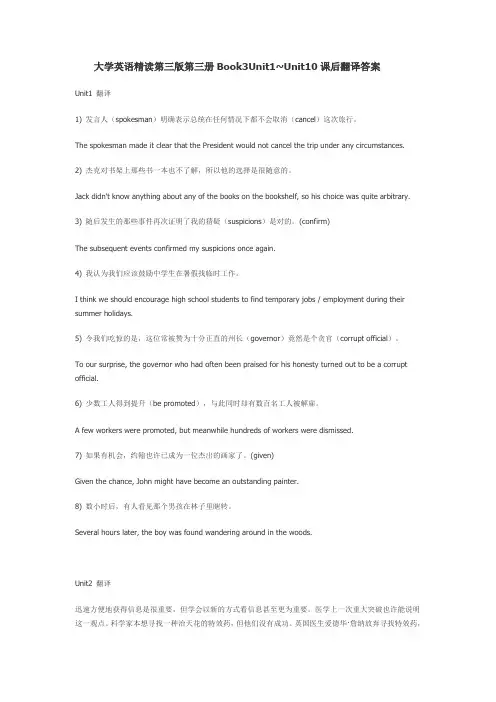
大学英语精读第三版第三册Book3Unit1~Unit10课后翻译答案Unit1 翻译1) 发言人(spokesman)明确表示总统在任何情况下都不会取消(cancel)这次旅行。
The spokesman made it clear that the President would not cancel the trip under any circumstances.2) 杰克对书架上那些书一本也不了解,所以他的选择是很随意的。
Jack didn't know anything about any of the books on the bookshelf, so his choice was quite arbitrary.3) 随后发生的那些事件再次证明了我的猜疑(suspicions)是对的。
(confirm)The subsequent events confirmed my suspicions once again.4) 我认为我们应该鼓励中学生在暑假找临时工作。
I think we should encourage high school students to find temporary jobs / employment during their summer holidays.5) 令我们吃惊的是,这位常被赞为十分正直的州长(governor)竟然是个贪官(corrupt official)。
To our surprise, the governor who had often been praised for his honesty turned out to be a corrupt official.6) 少数工人得到提升(be promoted),与此同时却有数百名工人被解雇。
A few workers were promoted, but meanwhile hundreds of workers were dismissed.7) 如果有机会,约翰也许已成为一位杰出的画家了。
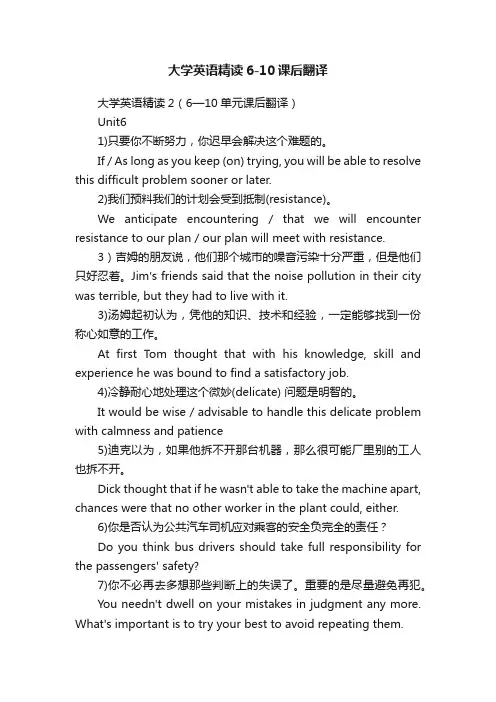
大学英语精读6-10课后翻译大学英语精读2(6—10单元课后翻译)Unit61)只要你不断努力,你迟早会解决这个难题的。
If / As long as you keep (on) trying, you will be able to resolve this difficult problem sooner or later.2)我们预料我们的计划会受到抵制(resistance)。
We anticipate encountering / that we will encounter resistance to our plan / our plan will meet with resistance.3)吉姆的朋友说,他们那个城市的噪音污染十分严重,但是他们只好忍着。
Jim's friends said that the noise pollution in their city was terrible, but they had to live with it.3)汤姆起初认为,凭他的知识、技术和经验,一定能够找到一份称心如意的工作。
At first Tom thought that with his knowledge, skill and experience he was bound to find a satisfactory job.4)冷静耐心地处理这个微妙(delicate) 问题是明智的。
It would be wise / advisable to handle this delicate problem with calmness and patience5)迪克以为,如果他拆不开那台机器,那么很可能厂里别的工人也拆不开。
Dick thought that if he wasn't able to take the machine apart, chances were that no other worker in the plant could, either.6)你是否认为公共汽车司机应对乘客的安全负完全的责任?Do you think bus drivers should take full responsibility for the passengers' safety?7)你不必再去多想那些判断上的失误了。

课文翻译(Unit1——10)第一单元Translation of Text A半日1我走在父亲的一侧,牢牢地抓着他的右手。
我身上穿的,戴的全是新的:黑鞋子,绿校服,红帽子。
然儿我一点儿也高兴不起来,因为今天我将第一次被扔到学校里去。
2母亲站在窗前望着我们缓缓前行,我也不时的回头看她,希望她会救我。
我们沿着街道走着,街道两旁是花园和田野,田野里栽满了梨树和椰枣树。
3“我为什么要去上学?”我问父亲,“是我做错了什么了吗?”4“我不是在惩罚你,”父亲笑着说道,“上学不是一种惩罚。
学校是把孩子培养成才的地方。
难道你不想象你哥哥们那样,成为一个有用的人吗?”5我不相信他的话。
我才不相信把我从家里拽出来,扔进那个大大的,高墙围绕的建筑里对我有什么真正的好处呢。
6到了学校门口,我们看到了宽阔的庭院,站满了孩子。
“自己进去吧,”我父亲说,“加入他们。
笑一笑,给其他的孩子做个好榜样。
”7我紧抓着父亲的手,犹豫不决。
但是父亲却把我轻轻地推开了。
“拿出点男子气概来,”他说,“从今天起你就要真正开始自己的生活了。
放学时我会在这等你的。
”8我走了几步,便看见了一些孩子的面孔。
他们中我一个也不认识。
他们也没有一个认识我的。
我感觉自己像是一个迷了路的陌生人。
然而这时有些男孩开始好奇的打量我,其中一个走过来问到,“谁带你来的?”9“我爸爸”我小声说道。
10“我爸爸死了,”他简短地说。
11我不知道该说些什么。
这时学校的门已经关上了,有些孩子哭了起来。
接着,铃响了,一位女士走了过来,后面跟着一群男人。
那些人把我们排成几行。
使我们形成一个错综复杂的队行,站在那四周高楼耸立的院子里。
每层楼都有长长的阳台,阳台上带有木制顶棚,从阳台上可以俯视到我们。
12“这是你们的新家,”那位女士说道,“这儿有你们的父母。
一切能带给你们快乐,对你们有益的事物,这儿都有。
因此擦干你们的眼泪,快快乐乐地面对生活。
”13这样看来我之前的顾虑都是毫无根据的了。
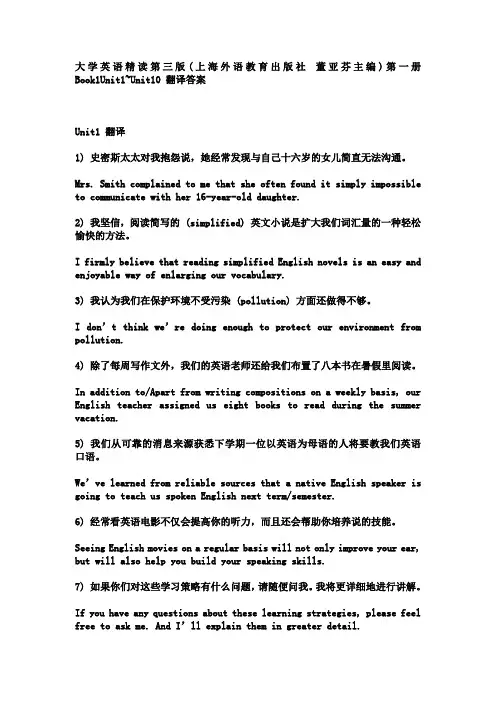
大学英语精读第三版(上海外语教育出版社董亚芬主编)第一册Book1Unit1~Unit10 翻译答案Unit1 翻译1) 史密斯太太对我抱怨说,她经常发现与自己十六岁的女儿简直无法沟通。
Mrs. Smith complained to me that she often found it simply impossible to communicate with her 16-year-old daughter.2) 我坚信,阅读简写的 (simplified) 英文小说是扩大我们词汇量的一种轻松愉快的方法。
I firmly believe that reading simplified English novels is an easy and enjoyable way of enlarging our vocabulary.3) 我认为我们在保护环境不受污染 (pollution) 方面还做得不够。
I don’t think we’re doing enough to protect our environment from pollution.4) 除了每周写作文外,我们的英语老师还给我们布置了八本书在暑假里阅读。
In addition to/Apart from writing compositions on a weekly basis, our English teacher assigned us eight books to read during the summer vacation.5) 我们从可靠的消息来源获悉下学期一位以英语为母语的人将要教我们英语口语。
We’ve learned from reliable sources that a native English speaker is going to teach us spoken English next term/semester.6) 经常看英语电影不仅会提高你的听力,而且还会帮助你培养说的技能。
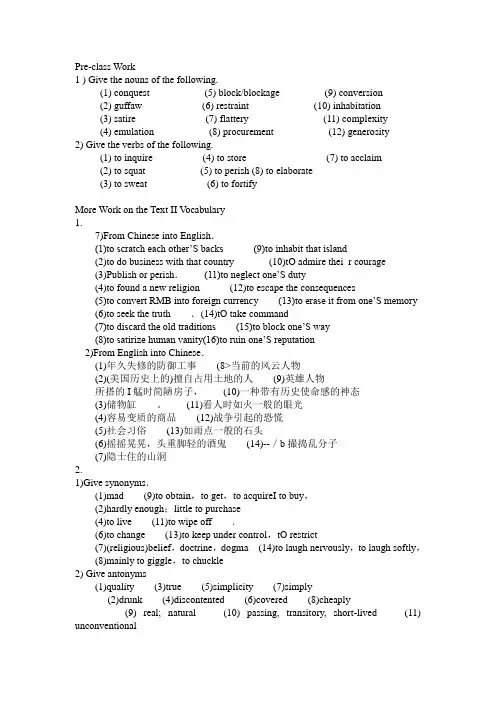
Pre-class Work1 ) Give the nouns of the following.(1) conquest (5) block/blockage (9) conversion(2) guffaw (6) restraint (10) inhabitation(3) satire (7) flattery (11) complexity(4) emulation (8) procurement (12) generosity2) Give the verbs of the following.(1) to inquire (4) to store (7) to acclaim(2) to squat (5) to perish (8) to elaborate(3) to sweat (6) to fortifyMore Work on the Text II V ocabulary1.7)From Chinese into English.(1)to scratch each other’S backs (9)to inhabit that island(2)to do business with that country (10)tO admire thei_r courage(3)Publish or perish.(11)to neglect one’S duty(4)to found a new religion (12)to escape the consequences(5)to convert RMB into foreign currency (13)to erase it from one’S memory(6)to seek the truth .(14)tO take command(7)to discard the old traditions (15)to block one’S way(8)to satirize human vanity(16)to ruin one’S reputation2)From English into Chinese.(1)年久失修的防御工事(8>当前的风云人物(2)(美国历史上的)擅自占用土地的人(9)英雄人物所搭的I艋时简陋房子,(10)一种带有历史使命感的神态(3)储物缸。
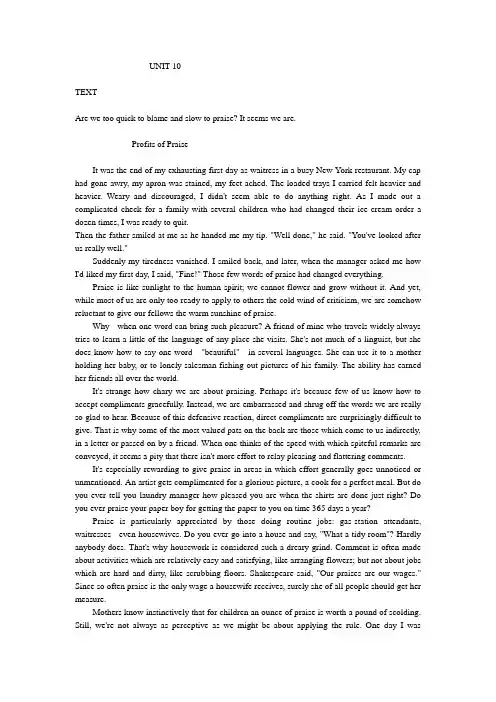
UNIT 10TEXTAre we too quick to blame and slow to praise? It seems we are.Profits of PraiseIt was the end of my exhausting first day as waitress in a busy New York restaurant. My cap had gone awry, my apron was stained, my feet ached. The loaded trays I carried felt heavier and heavier. Weary and discouraged, I didn't seem able to do anything right. As I made out a complicated check for a family with several children who had changed their ice-cream order a dozen times, I was ready to quit.Then the father smiled at me as he handed me my tip. "Well done," he said. "You've looked after us really well."Suddenly my tiredness vanished. I smiled back, and later, when the manager asked me how I'd liked my first day, I said, "Fine!" Those few words of praise had changed everything.Praise is like sunlight to the human spirit; we cannot flower and grow without it. And yet, while most of us are only too ready to apply to others the cold wind of criticism, we are somehow reluctant to give our fellows the warm sunshine of praise.Why - when one word can bring such pleasure? A friend of mine who travels widely always tries to learn a little of the language of any place she visits. She's not much of a linguist, but she does know how to say one word - "beautiful" - in several languages. She can use it to a mother holding her baby, or to lonely salesman fishing out pictures of his family. The ability has earned her friends all over the world.It's strange how chary we are about praising. Perhaps it's because few of us know how to accept compliments gracefully. Instead, we are embarrassed and shrug off the words we are really so glad to hear. Because of this defensive reaction, direct compliments are surprisingly difficult to give. That is why some of the most valued pats on the back are those which come to us indirectly, in a letter or passed on by a friend. When one thinks of the speed with which spiteful remarks are conveyed, it seems a pity that there isn't more effort to relay pleasing and flattering comments.It's especially rewarding to give praise in areas in which effort generally goes unnoticed or unmentioned. An artist gets complimented for a glorious picture, a cook for a perfect meal. But do you ever tell you laundry manager how pleased you are when the shirts are done just right? Do you ever praise your paper boy for getting the paper to you on time 365 days a year?Praise is particularly appreciated by those doing routine jobs: gas-station attendants, waitresses - even housewives. Do you ever go into a house and say, "What a tidy room"? Hardly anybody does. That's why housework is considered such a dreary grind. Comment is often made about activities which are relatively easy and satisfying, like arranging flowers; but not about jobs which are hard and dirty, like scrubbing floors. Shakespeare said, "Our praises are our wages." Since so often praise is the only wage a housewife receives, surely she of all people should get her measure.Mothers know instinctively that for children an ounce of praise is worth a pound of scolding. Still, we're not always as perceptive as we might be about applying the rule. One day I wascriticizing my children for squabbling. "Can you never play peacefully?" I shouted. Susanna looked at me quizzically. "Of course we can," she said. "But you don't notice us when we do."Teachers agree about the value of praise. One teacher writes that instead of drowning students' compositions in critical red ink, the teacher will get far more constructive results by finding one or two things which have been done better than last time, and commenting favorably on them. "I believe that a student knows when he has handed in something above his usual standard," writes the teacher, "and that he waits hungrily for a brief comment in the margin to show him that the teacher is aware of it, too."Behavioral scientists have done countless experiments to prove that any human being tends to repeat an act which has been immediately followed by a pleasant result. In one such experiment, a number of schoolchildren were divided into three groups and given arithmetic tests daily for five days. One group was consistently praised for its previous performance; another group was criticized; the third was ignored.Not surprisingly, those who were praised improved dramatically. Those who were criticized improved also, bus not so much. And the scores of the children who were ignored hardly improved at all. Interestingly the brightest children were helped just as much by criticism as by praise, but the less able children reacted badly to criticism, needed praise the most. Yet the latter are the very youngsters who, in most schools, fail to get the pat on the back.To give praise costs the giver nothing but a moment's thought and a moment's effort - perhaps a quick phone call to pass on a compliment, or five minutes spent writing an appreciative letter. It is such a small investment - and yet consider the results it may produce. "I can live for two months on a good compliment," said Mark Twain.So, let's be alert to the small excellences around us - and comment on them. We will not only bring joy into other people's lives, but also, very often, added happiness into out own.NEW WORDSprofitn. advantage or good obtained from sth... money gained in business 益处;利润exhaustvt. tire out 使筋疲力尽waitressn. woman waiterawrya. with a turn to one side 歪;斜apronn. 围裙stainvt. make dirty marks on 玷污loadvt. put a full amount of things on or in (sth.) 装满trayn. 托盘wearya. very tired 厌倦的,厌烦的discouragevt. cause to lose courage or confidence 使泄气,使灰心ice-creamn. 冰淇淋dozenn. twelve (一)打quitv. stop (doing sth.) and leave 离(职),不干sunlightn. light of the sun; sunshinehumana. of or concerning peopleapplyvt. 运用,实施applicationn.somehowad. for some reacon or other; in some way or other 不知怎么地,以某种方式reluctanta. unwilling 不情愿的;勉强的sunshinen. light of the sunlinguistn. person who is good at foreign languages; person who studies the science of language 通晓数国语言的人;语言学家salesmann. man whose work is selling a company's goods to businesses, homes, etc. 推销员earnvt. get in return for work or as a reward for one's qualities, etc. 挣得,赢得charya. careful; cautious 谨慎小心的complimentn. praise 赞美(话)vt. praise 赞美gracefullyad. 大大方方地;优美地gracefula.embarrassvt. make awkward or ashamed 使尴尬defensivea. 防御surprisinglyas. in a surprising manner or degreepatn. tap made with the open hand 轻拍v. tap gently with the open handindirectlyad. in an indirect way 间接地indirecta.spitefula. having or showing ill will 恶意的conveyvt. make (ideas, views, feelings, etc.) know to another person 转达,传达relayvt. 传送;传达flattervt. praise too much; praise insincerely (in order to please) 过奖;谄媚,奉承commentn. opinion, explanation or judgment written or spoken about an event, book, person, state of affairs, etc. 评论vi. make comments (on); give opinionsrewardinga. worthwhile; worth doing; giving a reward to 值得(做)的;报答的rewardvt.generallyad. usually 通常,一般地artistn. person who practises or works in one of the fine arts, esp. painting 画家,艺术家gloriousa. splendid 辉煌的laundryn. 洗衣店appreciatevt. understand and enjoy; be thankful for 欣赏,鉴赏;感谢,感激routinea. not unusual or exciting; regular 常规的,例行的gas-stationn. 加油站attendantn. 服务人员tidya. neatly arranged 整洁的,整齐的houseworkn. work done on taking care of a house 家务劳动drearya. dull and uninteresting 沉闷乏味的grindn. hard uninteresting work 苦差使scrubvt. clean by rubbing hard, esp. with a stiff brush 擦洗wagen. (pl.) 工资,报酬measuren. am adequate or due portion 份儿instinctivelyad. 本能地scoldvt. blame with angry words 申诉,怒骂perceptivea. 感觉灵敏的criticizevt. 批评squabblevi. quarrel, esp. noisily and unreasonably 争吵,口角peacefullyad. in a peaceful manner; quietly 安静地peacefula.quizzicallyad. 嘲弄地;疑惑地drownvt. cover completely with water; cause (sb.) to die by keeping under water 淹没;使(某人)淹死criticala. fault-finding 挑剔的,苛求的constructivea. helping 建设性的favo(u)rablyad. helping 赞成地,称赞地favo(u)rablea.briefa. using a few words; shortmarginn. blank space round the printed or written matter on a page 页边的空白behaviorala. of or relating to behavior 行为的countlessa. too many to be countedarithmeticn. science of numbers 算术consistentlyad. 始终如一地;一贯地consistenta.previousa. coming earlier in time or order 以前的lgnorevt. not to take notice of, pay no attention to 不理,忽视dramaticallyad. strikingly 显著地dramatica.reactvi. respond 反应youngstern. young person, esp. a boyappreciativea. thankful; gratefulinvestmentn. 投资investv.alerta. watchful and keen 警觉的excellencen. an excellent or valuable quality; virtuePHRASRS & EXPRESSIONSmake outwrite out; complete or fill in 开出;填写only toovery 极,非常not much of anot a very good 不十分好的fish outbring out after searching 掏出shrug offdismiss as not deserving attention or as sth. unimportant 耸肩表示对...不屑理睬pat on the backword or gesture of praise or encouragement 赞扬;鼓励pass onconvey (to another) 传递live ondepend upon for support 靠...生活PROPER NAMESJanet Graham珍妮特.格雷厄姆Shakespeare莎士比亚Susanna苏珊娜Mark Twain马克.吐温。
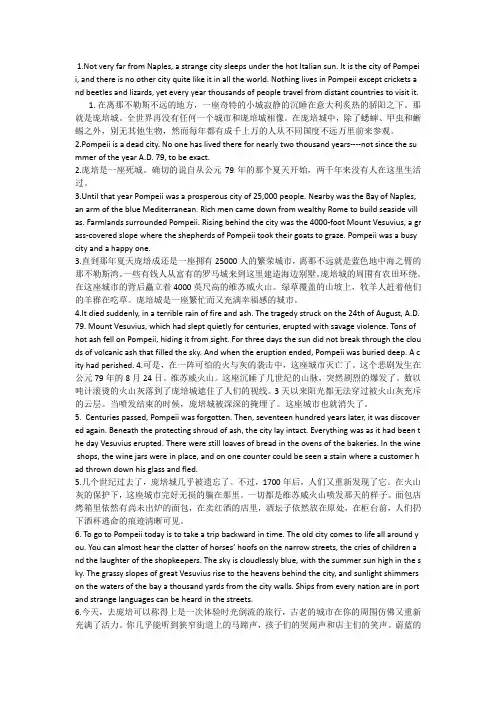
1.Not very far from Naples, a strange city sleeps under the hot Italian sun. It is the city of Pompei i, and there is no other city quite like it in all the world. Nothing lives in Pompeii except crickets a nd beetles and lizards, yet every year thousands of people travel from distant countries to visit it.1. 在离那不勒斯不远的地方,一座奇特的小城寂静的沉睡在意大利炙热的骄阳之下。
那就是庞培城。
全世界再没有任何一个城市和庞培城相像。
在庞培城中,除了蟋蟀、甲虫和蜥蜴之外,别无其他生物,然而每年都有成千上万的人从不同国度不远万里前来参观。
2.Pompeii is a dead city. No one has lived there for nearly two thousand years----not since the su mmer of the year A.D. 79, to be exact.2.庞培是一座死城。
确切的说自从公元79年的那个夏天开始,两千年来没有人在这里生活过。
3.Until that year Pompeii was a prosperous city of 25,000 people. Nearby was the Bay of Naples, an arm of the blue Mediterranean. Rich men came down from wealthy Rome to build seaside vill as. Farmlands surrounded Pompeii. Rising behind the city was the 4000-foot Mount Vesuvius, a gr ass-covered slope where the shepherds of Pompeii took their goats to graze. Pompeii was a busy city and a happy one.3.直到那年夏天庞培成还是一座拥有25000人的繁荣城市,离那不远就是蓝色地中海之臂的那不勒斯湾。
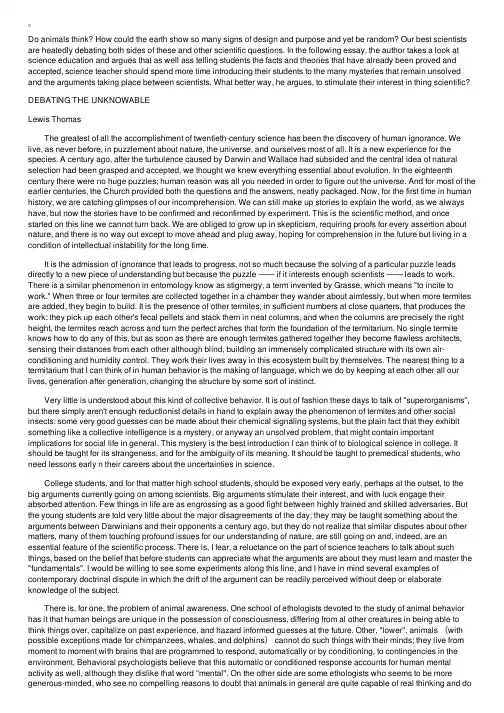
Do animals think? How could the earth show so many signs of design and purpose and yet be random? Our best scientists are heatedly debating both sides of these and other scientific questions. In the following essay, the author takes a look at science education and argues that as well ass telling students the facts and theories that have already been proved and accepted, science teacher should spend more time introducing their students to the many mysteries that remain unsolved and the arguments taking place between scientists. What better way, he argues, to stimulate their interest in thing scientific? DEBATING THE UNKNOWABLELewis Thomas The greatest of all the accomplishment of twentieth-century science has been the discovery of human ignorance. We live, as never before, in puzzlement about nature, the universe, and ourselves most of all. It is a new experience for the species. A century ago, after the turbulence caused by Darwin and Wallace had subsided and the central idea of natural selection had been grasped and accepted, we thought we knew everything essential about evolution. In the eighteenth century there were no huge puzzles; human reason was all you needed in order to figure out the universe. And for most of the earlier centuries, the Church provided both the questions and the answers, neatly packaged. Now, for the first time in human history, we are catching glimpses of our incomprehension. We can still make up stories to explain the world, as we always have, but now the stories have to be confirmed and reconfirmed by experiment. This is the scientific method, and once started on this line we cannot turn back. We are obliged to grow up in skepticism, requiring proofs for every assertion about nature, and there is no way out except to move ahead and plug away, hoping for comprehension in the future but living in a condition of intellectual instability for the long time. It is the admission of ignorance that leads to progress, not so much because the solving of a particular puzzle leads directly to a new piece of understanding but because the puzzle —— if it interests enough scientists —— leads to work. There is a similar phenomenon in entomology know as stigmergy, a term invented by Grasse, which means "to incite to work." When three or four termites are collected together in a chamber they wander about aimlessly, but when more termites are added, they begin to build. It is the presence of other termites, in sufficient numbers at close quarters, that produces the work: they pick up each other's fecal pellets and stack them in neat columns, and when the columns are precisely the right height, the termites reach across and turn the perfect arches that form the foundation of the termitarium. No single termite knows how to do any of this, but as soon as there are enough termites gathered together they become flawless architects, sensing their distances from each other although blind, building an immensely complicated structure with its own air-conditioning and humidity control. They work their lives away in this ecosystem built by themselves. The nearest thing to a termitarium that I can think of in human behavior is the making of language, which we do by keeping at each other all our lives, generation after generation, changing the structure by some sort of instinct. Very little is understood about this kind of collective behavior. It is out of fashion these days to talk of "superorganisms", but there simply aren't enough reductionist details in hand to explain away the phenomenon of termites and other social insects: some very good guesses can be made about their chemical signaling systems, but the plain fact that they exhibit something like a collective intelligence is a mystery, or anyway an unsolved problem, that might contain important implications for social life in general. This mystery is the best introduction I can think of to biological science in college. It should be taught for its strangeness, and for the ambiguity of its meaning. It should be taught to premedical students, who need lessons early n their careers about the uncertainties in science. College students, and for that matter high school students, should be exposed very early, perhaps at the outset, to the big arguments currently going on among scientists. Big arguments stimulate their interest, and with luck engage their absorbed attention. Few things in life are as engrossing as a good fight between highly trained and skilled adversaries. But the young students are told very little about the major disagreements of the day; they may be taught something about the arguments between Darwinians and their opponents a century ago, but they do not realize that similar disputes about other matters, many of them touching profound issues for our understanding of nature, are still going on and, indeed, are an essential feature of the scientific process. There is, I fear, a reluctance on the part of science teachers to talk about such things, based on the belief that before students can appreciate what the arguments are about they must learn and master the "fundamentals". I would be willing to see some experiments along this line, and I have in mind several examples of contemporary doctrinal dispute in which the drift of the argument can be readily perceived without deep or elaborate knowledge of the subject. There is, for one, the problem of animal awareness. One school of ethologists devoted to the study of animal behavior has it that human beings are unique in the possession of consciousness, differing from al other creatures in being able to think things over, capitalize on past experience, and hazard informed guesses at the future. Other, "lower", animals (with possible exceptions made for chimpanzees, whales, and dolphins) cannot do such things with their minds; they live from moment to moment with brains that are programmed to respond, automatically or by conditioning, to contingencies in the environment, Behavioral psychologists believe that this automatic or conditioned response accounts for human mental activity as well, although they dislike that word "mental". On the other side are some ethologists who seems to be more generous-minded, who see no compelling reasons to doubt that animals in general are quite capable of real thinking and doquite a lot of it —— thinking that isn't as dense as human thinking, that is sparser because of the lack of language and the resultant lack of metaphors to help the thought along, but thinking nonetheless. The point about this argument is not that one side or the other is in possession of a more powerful array of convincing facts; quite the opposite. There are not enough facts to sustain a genuine debate of any length; the question of animal awareness is an unsettled one. Another debatable question arises when one contemplates the whole biosphere, the conjoined life of the earth. How could it have turned out to possess such stability and coherence, resembling as it does a sort of enormous developing embryo, with nothing but chance events to determine its emergence? Lovelock and Margulis, facing this problem, have proposed the Gaia Hypothesis, which is, in brief, that the earth is itself a form of life, "a complex entity involving the Earth's biosphere, atmosphere, oceans and soil; the totality constituting a feedback or cybernetic system which seeks an optimal physical and chemical environment for life on this planet." Lovelock postulates, in addition, that "the physical and chemical condition of the surface of the Earth, of the atmosphere, and of the oceans has been an is actively made fit and comfortable by the presence of life itself." This notion is beginning to stir up a few signs of storm, and if it catches on, as I t h i n k i t w i l l , w e w i l l s o o n f i n d t h e b i o l o g i c a l c o m m u n i t y s p l i t i n t o f u m i n g f a c t i o n s , o n e s i d e s a y i n g t h a t t h e e v o l v e d b i o s p h e r e d i s p l a y s e v i d e n c e s o f d e s i g n a n d p u r p o s e , t h e o t h e r d e c r y i n g s u c h h e r e s y . I b e l i e v e t h a t s t u d e n t s s h o u l d l e a r n a s m u c h a s t h e y c a n a b o u t t h e a r g u m e n t . / p > p b d s f i d = " 1 1 1 " > 0 0 O n e m o r e c u r r e n t b a t t l e i n v o l v i n g t h e u n k n o w n i s b e t w e e n s o c i o b i o l o g i s t s a n d a n t i s o c i o b i o l o g i s t s , a n d i t i s a m a r v e l f o r s t u d e n t s t o b e h o l d . T o o b s e r v e , i n o p e n - m o u t h e d a s t o n i s h m e n t , o n e g r o u p o f h i g h l y i n t e l l i g e n t , b e a u t i f u l l y t r a i n e d , k n o w l e d g e a b l e , a n d i m a g i n a t i v e s c i e n t i s t s m a i n t a i n i n g t h a t a l l b e h a v i o r , a n i m a l a n d h u m a n , i s g o v e r n e d e x c l u s i v e l y b y g e n e s , a n d a n o t h e r g r o u p o f e q u a l l y t a l e n t e d s c i e n t i s t s a s s e r t i n g t h a t a l l b e h a v i o r s i s s e t a n d d e t e r m i n e d b y t h e e n v i r o n m e n t o r b y c u l t u r e , i s a n e d u c a t i o n a l e x p e r i e n c e t h a t n o c o l l e g e s t u d e n t s h o u l d b e a l l o w e d t o m i s s . T h e e s s e n t i a l l e s s o n t o b e l e a r n e d h a s n o t h i n g t o d o w i t h t h e r e l a t i v e v a l i d i t y o f t h e f a c t s u n d e r l y i n g t h e a r g u m e n t . I t i s t h e a r g u m e n t i t s e l f t h a t i s t h e e d u c a t i o n : w e d o n o t y e t k n o w e n o u g h t o s e t t l e s u c h q u e s t i o n s . / p > p b d s f i d = " 1 1 2 " > 0 0 N e w W o r d s / p > p b d s f i d = " 1 1 3 " > 0 0 d e b a t e / p >。
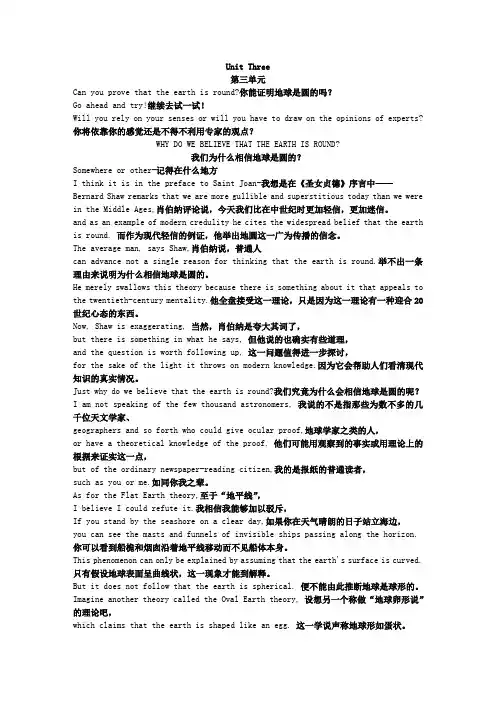
Unit Three第三单元Can you prove that the earth is round?你能证明地球是圆的吗?Go ahead and try!继续去试一试!Will you rely on your senses or will you have to draw on the opinions of experts? 你将依靠你的感觉还是不得不利用专家的观点?WHY DO WE BELIEVE THAT THE EARTH IS ROUND?我们为什么相信地球是圆的?Somewhere or other-记得在什么地方I think it is in the preface to Saint Joan-我想是在《圣女贞德》序言中——Bernard Shaw remarks that we are more gullible and superstitious today than we were in the Middle Ages,肖伯纳评论说,今天我们比在中世纪时更加轻信,更加迷信。
and as an example of modern credulity he cites the widespread belief that the earth is round. 而作为现代轻信的例证,他举出地圆这一广为传播的信念。
The average man, says Shaw,肖伯纳说,普通人can advance not a single reason for thinking that the earth is round.举不出一条理由来说明为什么相信地球是圆的。
He merely swallows this theory because there is something about it that appeals to the twentieth-century mentality.他全盘接受这一理论,只是因为这一理论有一种迎合20世纪心态的东西。
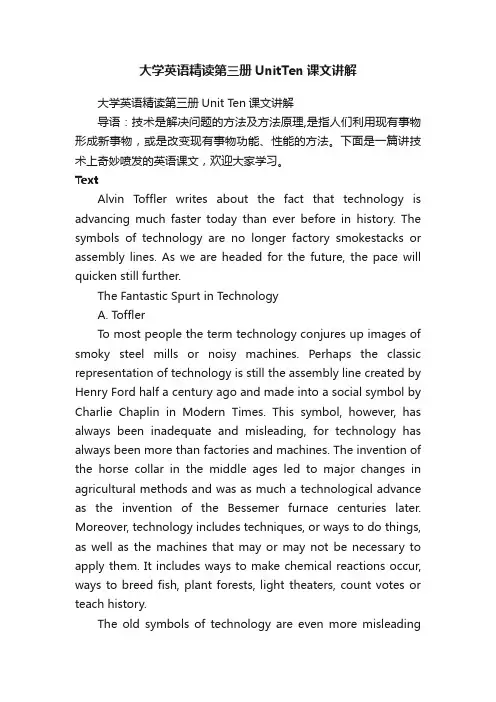
大学英语精读第三册UnitTen课文讲解大学英语精读第三册Unit Ten课文讲解导语:技术是解决问题的方法及方法原理,是指人们利用现有事物形成新事物,或是改变现有事物功能、性能的方法。
下面是一篇讲技术上奇妙喷发的英语课文,欢迎大家学习。
TextAlvin Toffler writes about the fact that technology is advancing much faster today than ever before in history. The symbols of technology are no longer factory smokestacks or assembly lines. As we are headed for the future, the pace will quicken still further.The Fantastic Spurt in TechnologyA. TofflerTo most people the term technology conjures up images of smoky steel mills or noisy machines. Perhaps the classic representation of technology is still the assembly line created by Henry Ford half a century ago and made into a social symbol by Charlie Chaplin in Modern Times. This symbol, however, has always been inadequate and misleading, for technology has always been more than factories and machines. The invention of the horse collar in the middle ages led to major changes in agricultural methods and was as much a technological advance as the invention of the Bessemer furnace centuries later. Moreover, technology includes techniques, or ways to do things, as well as the machines that may or may not be necessary to apply them. It includes ways to make chemical reactions occur, ways to breed fish, plant forests, light theaters, count votes or teach history.The old symbols of technology are even more misleadingtoday, when the most advanced technological processes are carried out far from assembly lines or blast furnaces. Indeed, in electronics, in space technology, in most of the new industries, quiet and clean surroundings are characteristic -- even sometimes essential. And the assembly line -- the organization of large numbers of men to carry out simple repetitive functions -- is outdated. It is time for our symbols of technology to change -- to catch up with the quickening change in technology itself.This acceleration is frequently dramatized by a brief account of the progress in transportation. It has been pointed out, for example, that in 6000 BC the fastest transportation available to man over long distances was the camel caravan, averaging eight miles per hour (mph). It was not until about 1600 BC when the chariot was invented that the maximum speed was raised to roughly twenty miles per hour.So impressive was this invention, so difficult was it to exceed this speed limit, that nearly 3,500 years later, when the first mail coach began operating in England in 1784, it averaged a mere ten mph. The first steam locomotive, introduced in 1825, could have a top speed of only thirteen mph and the great sailing ships of the time labored along at less tan half that speed. It was probably not until the 1880's that man, with the help of a more advanced steam locomotive, managed to reach a speed of one hundred mph. It took the human race millions of years to attain that record.It took only fifty-eight years, however, to go four times that fast, so that by 1938 men in airplanes were traveling at better than 400 mph. It took a mere twenty-year flick of time to double the limit again. And by the 1960's rocket plants approached speeds of 4,00 mph. and men in space capsules were circling theearth at 18,000 mph.Whether we examine distances traveled, altitudes reached, or minerals mined, the same accelerative trend is obvious. The pattern, here and in a thousand other statistical series, is absolutely clear and unmistakable. Thousands of years go by, and then, in our won times, a sudden bursting of the limits, a fantastic spurt forward.The reason for this is tat technology feeds on itself. Technology makes more technology possible, as we can see if we look for a moment at the process of innovation. Technological innovation consists of three stages, linked together into a self-reinforcing cycle. First, there is the creative, feasible idea. Second, its practical application. Third, its diffusion through society.The process is completed, the loop closed, when the diffusion of technology embodying the new idea, in turn, helps generate new creative ideas. Today there is evidence that the time between each of the steps in this cycle has been shortened.Thus it is not merely true, as frequently noted, that 90 percent of all the scientists who ever lived are now alive, and that new scientific discoveries are being mad every day. These new ideas are put to work much more quickly than ever before. The time between the first and second stages of the cycle -- between idea and application -- has been radically reduced. This is a striking difference between ourselves and our ancestors. It is not that we are more eager or less lazy than our ancestors, but we have, with the passage of time, invented all sorts of social device to hasten the process.But if it takes less time to bring a new idea to the marketplace, it also takes less time for it to sweep through the society. For example, the refrigerator was introduced in the United Statesbefore 1920, yet its peak production did not come until more than thirty years later. However, by 1950 -- in only a few years -- television had grown from a laboratory novelty to the biggest part of show business. So the interval between the second and third stages of the cycle -- between application and diffusion -- has likewise been cut, and the pace of diffusion is rising with astonishing speed.The stepped-up pace of invention, application and diffusion, in turn, accelerates the whole cycle still further. For new machines or techniques are not merely a product, but a source, of fresh creative ideas.NEW WORDSfantastica. unbelievably large or great 极大的';难以置信的 spurtn. a short sudden increase of activity, effort or speed; burst 猛增;突然加速;迸发conjurevt. cause (sth.) to appear in the mind 唤起;使想起smokya. giving out much smokemilln. factory or workshopclassica. typical 经典的,典型的representationn. sth. that represents 代表represent vt.symboln. sign, mark, or object which represents a person, idea, value, etc. 象征inadequatea. not adequate; insufficientmisleadinga. causing wrong conclusions; causing mistakes mislead vt.inventionn. the act of inventing; sth. inventedhorse collar马轭agriculturala. of agriculturefurnacen. 熔炉,炉子applyvt. put into use or operation 应用,运用occurvt. take place; happenbreedvt. raise (esp. animals) 饲养voten. 选票;选举(权)advanceda. far on in development; modernblastn. 鼓风;送风blast furnace鼓风炉;高炉electronicsn. 电子技术;电子学surroundingsn. (used with a pl. v. ) everything around and about a place; conditions of life 环境characteristica. showing the individual character 表示特性的essentiala. necessary; most importantorganizationn. the act of organizing; an organized body or systemrepetitiven. the act of organizing; an organized body or systemrepetitivea. of or characterized by the act of repeatingrepetition n.functionn. special duty (of a person) or purpose (of a thing) 职责,功能,作用outdateda. no longer in general use; old-fashioned 过时的quickenv. make or become quick(er)accelerationn. 加速dramatizevt. put into dramatic from; express or represent (sth.) in a dramatic or exaggerated wayaccountn. report or descriptiontransportationn. the business of carrying people or goods from one place to another 运输transport vt.BC abbr.Before ( the birth of) Christ 公元前availablea. capable of being got, obtained, used, etc. 可获得的;可利用的cameln. 骆驼caravan。
课文翻译(Unit1——10)第一单元Translation of Text A半日1我走在父亲的一侧,牢牢地抓着他的右手。
我身上穿的,戴的全是新的:黑鞋子,绿校服,红帽子。
然儿我一点儿也高兴不起来,因为今天我将第一次被扔到学校里去。
2母亲站在窗前望着我们缓缓前行,我也不时的回头看她,希望她会救我。
我们沿着街道走着,街道两旁是花园和田野,田野里栽满了梨树和椰枣树。
3“我为什么要去上学?”我问父亲,“是我做错了什么了吗?”4“我不是在惩罚你,”父亲笑着说道,“上学不是一种惩罚。
学校是把孩子培养成才的地方。
难道你不想象你哥哥们那样,成为一个有用的人吗?”5我不相信他的话。
我才不相信把我从家里拽出来,扔进那个大大的,高墙围绕的建筑里对我有什么真正的好处呢。
6到了学校门口,我们看到了宽阔的庭院,站满了孩子。
“自己进去吧,”我父亲说,“加入他们。
笑一笑,给其他的孩子做个好榜样。
”7我紧抓着父亲的手,犹豫不决。
但是父亲却把我轻轻地推开了。
“拿出点男子气概来,”他说,“从今天起你就要真正开始自己的生活了。
放学时我会在这等你的。
”8我走了几步,便看见了一些孩子的面孔。
他们中我一个也不认识。
他们也没有一个认识我的。
我感觉自己像是一个迷了路的陌生人。
然而这时有些男孩开始好奇的打量我,其中一个走过来问到,“谁带你来的?”9“我爸爸”我小声说道。
10“我爸爸死了,”他简短地说。
11我不知道该说些什么。
这时学校的门已经关上了,有些孩子哭了起来。
接着,铃响了,一位女士走了过来,后面跟着一群男人。
那些人把我们排成几行。
使我们形成一个错综复杂的队行,站在那四周高楼耸立的院子里。
每层楼都有长长的阳台,阳台上带有木制顶棚,从阳台上可以俯视到我们。
12“这是你们的新家,”那位女士说道,“这儿有你们的父母。
一切能带给你们快乐,对你们有益的事物,这儿都有。
因此擦干你们的眼泪,快快乐乐地面对生活。
”13这样看来我之前的顾虑都是毫无根据的了。
2014101018第十单元Translation of Text A曼德拉的菜园1 1977年初,当局宣布解除集体劳动,给我们安排了一些院内的工作,因此我们可以在自己的这片区域里打发时间了。
结束了体力劳动就像解放了一样。
现在我每天可以读书、谢辛和我的狱友讨论问题,或者准备法律文件。
时间上的自由还得以让我继续从事在罗本岛上培养起来的两大爱好:园艺和网球。
2 为了在狱中生存,你必须使自己在日常生活中得到满足。
你可以通过把衣服洗的特别干净,把门前过道打扫得一尘不染,或把自己的牢房整理出尽可能大的空间这些方法使自己感到充实。
同一个在监狱外的人为自己完成重要任务而感到骄傲一样,监狱的人也可以完成未完成一件小事而同样感到自豪。
3 几乎刚在罗本岛被判刑时起,我就向当局提出申请,我在院子里开垦一块菜园。
多年来,他们没有给出任何原因,却一直拒绝我的请求。
但最终他们让步了,这样我们能够在远处墙根下一块狭长的地面上划出小片面积的地方做菜园。
4 院子里的土壤很干,而且石头很多。
这个院子在建起来之前是个垃圾场,因此为了开辟这个园子,我的清除掉大量的石头,给植物留出生长的空间。
当时,一些狱友开玩笑说我骨子里是个矿工,整天呆在一片荒地里,把自己的空闲时间都花费在挖院子里的地了。
5 狱方给我提供了种子。
开始时,我种了番茄、辣椒和洋葱——都是些不需要肥沃的土壤或经常照料的生命力很强的植物。
早期的收成不好,但很快状况就有了改善。
狱方不会后悔允许我开辟菜园种菜的,因为菜园的蔬菜长的好起来后,我就经常给看守们一些最好的番茄和洋葱。
6 虽然我一直喜爱园艺,但直到入狱后我才得到一片属于自己的菜园。
在园艺方面的第一次经历是在海尔堡,那是大学时作为体力劳动要求的一部分,我在一位教授家的院子里干活,在那里我享受着脑力劳动之余和土地之间的接触。
但自从我到约翰内斯堡学习并工作以后,就在没有时间和没有地方种菜了。
7 我开始订阅一些关于园艺方面的书籍。
第十单元你将工作视为负担还是机会?你是那种想尽办法保存精力的人还是发觉消耗精力令人满足的人?人们为什么喜欢抱怨工作?在下文中寻找答案吧。
人为什么工作伦纳德·R·塞尔斯到的要多得多。
我们都习惯于认为工作为人生提供物质的东西——提供使我们的现代文明成为可能的商品和服务。
但是我们对工作在促进精神生活方面所起的作用则知之甚少。
这方面的作用难以捉摸,却更加至关重要,它是人生过得充实还是空虚的决定性因素。
到那些老一套的怨言:“我巴不得早点放假”,“今天我要是呆在家里该多好”,“我的老板待我不好”,“我的事情多得来不及做”等等。
在这种情况下,当你得悉心理学家们以及其他的行为科学家们都认为,工作对个人幸福和个人成就起着积极作用时,你很可能会感到惊奇。
对大多数人来说,工作不仅仅是一种必需,它还是人们生活的焦点,是他们的个性和创造性的源泉。
精神病诊所的主治医生观察到工作的治疗作用。
许许多多在诊所里显得精神抑郁的病人,一旦受聘从事有一定收益的工作时,便重新获得自信,并失去部分(如果不是全部的话)最严重的症状。
越来越多的处理精神病问题的机构建立起工场,病情过重在“外面的”工厂里找不到工作的病人,可以在那里工作。
与此同时,这些机构还竭尽全力为那些身体条件尚可在外面工作的人,安排“真正的”工作。
即使没有引起经济上的忧虑,也常常带来“今后我该怎样生活才好?”之类的许多问题。
许多人一到周末因为不上班而必须自行安排生活便产生头痛及其他不适。
人们还观察到,失业除了产生经济压力之外,还造成许多心理上的病痛,很多人一旦失业,身体便迅速恶化。
?为什么工作竟然是人们获得满足的如此重要的源泉呢?最主要的答案就在于,工作和通过工作所取得的成就,能激起一种自豪感。
对成就的自豪办成事情。
我们每个人都希望自己能够做出有意义、并能显示出自己天赋的事来。
他深情地将某一种价值不高的材料做成一件或是有用,或是美观,或是两者兼备的东西。
你可以看到木匠或砖瓦匠常站到一边,欣赏自己的产品。
Book 3 Unit 101.do one’s business (委婉)= empty one’s bowels 排便2.out of one’s hands 不再有sb 掌管3.squat down 蹲下squat on 蹲坐在;责难;制止4.at dawn 黎明5.a few handfuls of water 一把/一捧水6.fill up with 用……充满7.know of 听说过8.a shower of 一阵9.dress oneself 给自己穿衣服10.by choice 自愿地11.by design 故意地12.put on his shoes for him 为他穿鞋带13.show one’s teeth 龇牙咧嘴14.bark at 咆哮的说出15.look over 检查;查看16.man of his age 与他同龄17.in particular 尤其18.take command of 挂帅;负责指挥19.seek sth with sb 求sb给予sth seek Talent with Eagerness 求贤若渴seek out 搜出;挑出20.call upon 拜访21.greet him with 与……打招呼bor to do 努力去做23.possess v. 拥有;控制possession n. be in possession of sth= have sth in one’s possession 拥有possessive a. 占有的24.roll v.滚动;卷;roll down (泪珠)滚落n. 卷形物25.form n..形式;表格;(艺术;文学)结构v. 形成;制造;建立;呈某种状态26.appoint v.委任;任命;安排(时间地点);约定appoint sb as sth 决定sb 为appoint sb to a certain position 任命sb为appoint sb to do sth 委派sb做27.account v. 认为…如何;说明account for 对…做解释;占(百分比,数量);共计account n. 账户;解释;账单give an account 描述take sth into account 考虑on one’s account 为了sb的利益on this/that account 由于这个缘故on no account 绝对不可以28.show off 卖弄;陈列;使显眼show up 露面;揭露show sb around 带sb参观show sb in 领sb进入swhfor show 为了给sb看(而不是为了实际用处)29.hand over 移交;交出(权力)fall into the hand of 落入…的手中by hand 用手的,手工的;in hand 在手头;在进行中;get out of hand 失去控制near at hand 在手边,在附近;迫近,即将到来30.wash away 冲洗;冲刷;忘却Translation1.你对他的这种古怪行为怎么解释?How do you account for his strange behavior?2.我们来围成一个圈吧,这样大家说话时互相就能看得见了。
大学英语精读第四册第十单元内容详解大学英语精读第四册第十单元内容详解导语:工作对社会的意义,社会的发展进步,与每个社会组成成员的选择倾向是有密切关系的。
下面是一篇关于人为什么工作的英语课文,欢迎阅读。
TextDo you view work as a burden or an opportunity? Are you the kind of person who looks for ways to save your energy or the kind that finds spending your energy satisfying? Why do people like to complain about work? Find the answers to question like these in the following essay.WHY PEOPLE WORKLeonard R. SaylesJobs and work do much more than most of us realize to provide happiness sand contentment. We're all used to thinking that work provides the material things of life -- the goods and services that make possible our modern civilization. But we are much less conscious of the extent to which work provides the more intangible, but more crucial, psychological well-being that can make the difference between a full and an empty life.Historically, work has been associated with slavery and sin and punishment. And in our own day we are used to hearing the traditional complaints: "I can't wait for my vacation," "I wish I could stay home today," "My boss treats me poorly," "I've got too much work to do and not enough time to do it." Against this background, it may well come as a surprise to learn that not only psychologists but other behavioral scientists have come to accept the positive contribution of work to the individual's happiness and sense of personal achievement. Work is more thana necessity for most human beings; it is the focus of their lives, the source of their identity and creativity.Rather than a punishment or a burden, work is the opportunity to realize one's potential. Many psychiatrists heading mental health clinics have observed its healing effect. A good many patients who feel depressed in clinics gain renewed self-confidence when gainfully employed and lose some, if not all, of their most acute symptoms. Increasingly, institutions dealing with mental health problems are establishing workshops wherein those too sick to get a job in "outside" industry can work, while every effort is exerted to arrange "real" jobs for those well enough to work outside.And the reverse is true, too. For large numbers of people, the absence of work is harmful to their health. Retirement often brings many problems surrounding the "What do I do with myself?" question, even though there may be no financial cares. Large numbers of people regularly get headaches and other illnesses on weekends when they don't have their jobs to go to, and must fend for themselves. It has been observed that unemployment, quite aside from exerting financial pressures, brings enormous psychological troubles and that many individuals deteriorate rapidly when jobless.But why? Why should work be such a significant source of human satisfaction? A good share of the answer rests in the kind of pride that is stimulated by the job, by the activity of accomplishing.Pride in AccomplishmentThe human being longs for a sense of being accomplished, of being able to do things, with his hand, with his mind, with his will. Each of us wants to feel he or she has the ability to dosomething that is meaningful and that serves as a tribute to our inherent abilities.It is easiest to see this in the craftsman who lovingly shapes some cheap material into an object that may be either useful or beautiful or both. You can see the carpenter or bricklayer stand aside and admire the product of his personal skill.But even where there is no obvious end product that is solely attributable to one person's skill, researchers have found that employees find pride in accomplishment. Our own research in hospitals suggests that even the houskeeping and laundry staffs take pride in the fact that in their own ways they are helping to cure sick people -- and thus accomplishing good deal.We're often misled by the complaints surrounding difficult work; deep down most people regard their won capacity to conquer the tough job as the mark of their own unique personality. Complaining is just part of working After all, how else do you know who you are, except as you can demonstrate the ability of your mind to control you limbs ad hands and words? You are, in significant measure, what you can do.Some are deceived into thinking that people like to store up energy, to rest and save themselves as much as possible. Just the opposite. It is energy expenditure that is satisfying.Just watch an employee who must deal with countless other people because his or her job is at some central point in a communications network: a salesman at a busy counter, a stock broker on the phone, a customer representative. They will tell you how much skill and experience it takes to answer countless questions and handle various kinds of personalities every hour of the day. Not everyone can interact with such persistence and over long hours, but those who do, pride themselves on a distinctiveability that contributes mightily to the running of the organization.But work is more than accomplishment and pride in being able to command the job, because except for a few craftsmen and artists most work takes place "out in the world," with an through other people.Esprit de corpsPerhasps an example will make the point:I remember viewing a half dozen me in a chair factory whose job it was to bend several pieces of steel and attach them so that a folding chair would result. While there were ten or twelve of these "teams" that worked together, one in particular was known for its perfect coordination and lightning-like efforts. The men knew they were good. They would work spurts for twenty or thirty minutes before taking a break -- to show themselves, bystanders and other groups what it was to be superbly skilled and self-controlled, to be the best in the factory.When I talked with them, each expressed enormous pride in being a part of the fastest, best team. And this sense of belonging to an accomplished work group is one of the distinctive satisfactions of the world of work.One further word about work group satisfactions. Unlike may other aspects of life, relationships among people at work tend to be simpler, less complicated, somewhat less emotional. This is not to say there aren't arguments and jealousies, but, on the whole, behavioral research discloses that human relations at work are just easier, perhaps because they are more regular and predictable and thus simpler to adjust to than the sporadic, the more intense and less regular relationships in the community. And the work group also gently pressures its members to learnhow to adjust to one another so that the "rough edges" are worked off because people know they must do certain things with and through one another each day.Beyond the team and the work group, there is the organization, whether it be company or hospital or university. The same pride in being part of a well-coordinated, successful unit is derived from being part of a larger collectivity. Working for a company that is though of as being part of the best in the community can provide employees with both status and self-confidence. They assume, usually with good reason, that others regard them more highly, even envy them, and that they are more competent than the average because of this association with a "winner," a prestigious institution. We in truth bask in the reflected glory of the institution, and we seek ways of asserting our membership so that others will know and can recognize our good fortune.New Wordscontentmentn. happiness; satisfaction 满足civilizationn. 文明intangiblea. that can not be touched or grasped 触摸不到的cruciala. decisive; critical 决定性的,关键的pschologicala. of the soul or mind 心理的historicallyad. in the course of history, in accordance with or in respect to historyassociatevt. connect or bring together in one's mind 联想slaveryn. the system of having slaves; the condition of being a slave 奴隶制度;奴隶身份sinn. behavior that is against the principles of morality; an immoral act 罪孽punishmentn. punishing or being punished 惩罚complaintn. complaining; a statement expressing unhappiness, pain, dissatisfaction 抱怨behaviorala. of or having to do with behavior 行为的contributionn. act of contributing; sth. contributednecessityn. sth. that is necessary; the condition of being necessary, needed or unavoidable 必需品;必要性focusn. the central point; centre of interest 焦点creativityn. the ability to produce new and orignal ideas and things; inventiveness创造性clinicn. building or part of a hospital where doctors give specialized medical treatment and advice; a medical institution for special purposes 诊所healv. (cause to) become healthy 治愈,愈合,痊愈depresseda. sad; low in spirits 精神抑郁的,情绪沮丧的depressvt. make sad, low in spiritsrenewvt. reestablish; give new life and freshness to 使更新gainfullyad. profitablyacutea. severe; strong 严重的,急性的'symptoma. a change in the body's condition that indicates illness 症状institutionn. a society, club, college or any organization established for some public or social purpose 公共机构workshopn. a room of building which contains tools or machinery for making or repairing things 车间,工场whereinconj. in whichexertvt. use(strength, skill, etc.) 尽力reversen. the opposite; the other way round, the back 相反,背面absencen. non-existence; lackretirementn. instance of retiring or being retired; condition of being retired 退休financiala. relating to money 财政的;金融的weekendn. Saturday and Sunday, esp. when considered as a holiday from workfendvi. provide(for) 供养;照料unemploymentn. the state of being unemployedsignificanta. of noticeable importance or effect 重大的significance n.satisfactionn. be state of being satisfied 满足satisfactory a.accomplisheda. skilled, expert 有才艺的;有造诣的tributen. material evidence of one's worth, virtue, etc.inherenta. existing as a natural and permanent part or quality of 内在的,生来的craftsmann. a highly skilled workman 手艺人,(名)工匠bicklayern. a workman who builds with bricksattributablea. that can be attributed 可归因于……的attributevt. 把……归因为housekeepingn. management of a home and its affairs 家政staffn. the group of workers who carry on a job (全体)员工capacityn. ability, power; the amount that sth. can hold or produce 能力;容量tougha. difficult to do or deal with 艰巨的uniquen. being the only one of its type 独特的limbn. the leg, arm. or wing of an animal 肢,翼oppositen. a person or thing that is entirely different from another 对立面,对立物countlessa. very many; too many to be countedbrokern. person who buys and sells for others 经纪人,掮客stock brokern. a person who buys and sells stocks and bonds for other for a commission 证券经纪人representativen. a person acting in place of one or more others 代表interactvi. act on each other 相互作用persistencen. the act or fact of keeping on doing sth in spite of difficulty or opposition 坚持persist vi.distinctivea. clearly marking a person or thing as different from other 特殊的;与众不同的mightilyad. with power and strength; greatlyesprit de corpsn. (French) spirit of loyalty and devotion which unites the members of a group or society 团体精神,集体荣誉感coordinationn. harmonious adjustment or working together 协调coordinate vt.lightning闪电bystandern. a person standing near but not taking part in an event or activity; onlooker 旁观者superblyad. magnificently; first classaspectn. one side or view of a subject 方面relationshipn. a friendship between people; connection 关系disclosemake known; show by uncovering 揭示sporadica. occurring now and then; occasional 零星发生的,偶尔的collectivityn. people collectively, especially as forming a community or state 集体collective a.statusn. (high) social or professional position 地位,身份envyvt. feel admiration or ill-will toward (sb.) because he has the good fortune one wishes to have 羡慕;妒忌winnern. one that wins or seems destined to win or be successful prestigiousa. having respect that results from the good reputation (of a person, nation, etc.)有声望的baskvi. sit or lie in enjoyable warmth and light (舒适地) 取暖,享受reflectvt. throw back (light, heat, sound or image) 反射;反映assertvt. demonstrate the existence of; declare forcefully 宣称,断言membershipn. the state of being a member, of a club, society, etc. all the members of a club, society, etc.Phrases & Expressionsassociate withconnect with (often mentally) 把…与…联系在一起rather thaninstead offend for oneselflook after oneself 照料自己,自行谋生aside frombesides, apart from 除…以外long fordesire (to have )sth. strongly 渴望take pride infell please and happy because of 为…而感到得意store upput away for future use 储存,储备pride oneself onregard as a special reason for pride or satisfaction 以……自豪make the/one's pointprove that sth. is true 证明一个论点in particularespeciallyat workbusy at a job; doing workone the wholeconsidering everything; in generalwork offget rid of, dispose 除去,清除。
大学英语精读(第三版)第2册U7-10课文翻译UNIT2-7Not On My Block人们认为埃塞尔·阿姆斯特德准是疯了,竟然敢去面对那些在她房子外面贩卖毒品的年轻人。
但埃塞尔已忍无可忍。
她鼓足勇气,走出去跟那帮人谈话。
下面就是所发生的故事。
离开我这个街区琳恩·罗塞利尼埃塞尔·阿姆斯特德一下子就喜欢上了那栋灰色的联房。
房子里多出了一间卧室,还有一个很大的后院,可以让她的小外孙和外孙女在那儿玩耍。
那个大理石的门廊将是夏天夜晚坐着乘凉的理想场所。
但搬进来后的第一个晚上,当阿姆斯特德下班回到家时,她却发现有一帮样子很凶的人坐在她家门前的台阶上。
她大吃一惊,说道:“请原谅,我住在这儿。
”那一帮七个年轻人不情愿地站了起来,用冷酷无情的目光盯着她看。
一走进去,阿姆斯特德就锁上门,从窗口往外看。
她吃惊地发现那几个年轻人已经又坐在了她家的台阶上。
在以后的几个星期里,阿姆斯特德了解到她那栋房子过去长期空关时,曾被一些毒品贩子用来在前面台阶下面藏过毒品。
当川流不息的车辆和行人经过时,毒品贩子就在门廊上做生意。
吸毒成瘾的人就在房子后面的小路上注射毒品,并在后院里随地撒尿。
阿姆斯特德对占用她家前门的那些人不抱任何幻想。
在东巴尔的摩那个充满犯罪与暴力的奥利弗地区居住的十年间,几乎每个晚上,她躺在床上都能听到毒品战激烈进行时的枪击声。
但是,(在)这栋房子,有毒品贩子经常出没于她的门廊却是最糟糕的。
有时候她一天要报警好几次,恳请警察把这些毒品贩子驱散。
但警车一旦在街角消失,那些毒品贩子们又会陆陆续续地回来。
作为一个50多岁、子女已经长大成人的母亲,阿姆斯特德从未想像过要进行这场战斗。
但这并不是她第一次奋起应付突如其来的挑战了。
在20世纪90年代中期,当她自己的女儿染上毒瘾,她的小外孙和外孙女需要人领养时,阿姆斯特德就把那三个男孩和一个女孩领来照管了。
2000年9月的一个夜晚,在她迁入新居后大约一个月的时候,阿姆斯特德向上帝祈祷:“明天我要跟那些家伙谈一谈。
第十单元
你将工作视为负担还是机会?你是那种想尽办法保存精力的人还是发觉消耗精力令人满足的人?人们为什么喜欢抱怨工作?在下文中寻找答案吧。
人为什么工作
伦纳德·R·塞尔斯
到的要多得多。
我们都习惯于认为工作为人生提供物质的东西——提供使我们的现代文明成为可能的商品和服务。
但是我们对工作在促进精神生活方面所起的作用则知之甚少。
这方面的作用难以捉摸,却更加至关重要,它是人生过得充实还是空虚的决定性因素。
到那些老一套的怨言:“我巴不得早点放假”,“今天我要是呆在家里该多好”,“我的老板待我不好”,“我的事情多得来不及做”等等。
在这种情况下,当你得悉心理学家们以及其他的行为科学家们都认为,工作对个人幸福和个人成就起着积极作用时,你很可能会感到惊奇。
对大多数人来说,工作不仅仅是一种必需,它还是人们生活的焦点,是他们的个性和创造性的源泉。
精神病诊所的主治医生观察到工作的治疗作用。
许许多多在诊所里显得精神抑郁的病人,一旦受聘从事有一定收益的工作时,便重新获得自信,并失去部分(如果不是全部的话)最严重的症状。
越来越多的处理精神病问题的机构建立起工场,病情过重在“外面的”工厂里找不到工作的病人,可以在那里工作。
与此同时,这些机构还竭尽全力为那些身体条件尚可在外面工作的人,安排“真正的”工作。
即使没有引起经济上的忧虑,也常常带来“今后我该怎样生活才好?”之类的许多问题。
许多人一到周末因为不上班而必须自行安排生活便产生头痛及其他不
适。
人们还观察到,失业除了产生经济压力之外,还造成许多心理上的病痛,很多人一旦失业,身体便迅速恶化。
?为什么工作竟然是人们获得满足的如此重要的源泉呢?最主要的答案就在于,工作和通过工作所取得的成就,能激起一种自豪感。
对成就的自豪
办成事情。
我们每个人都希望自己能够做出有意义、并能显示出自己天赋的事来。
他深情地将某一种价值不高的材料做成一件或是有用,或是美观,或是两者兼备的东西。
你可以看到木匠或砖瓦匠常站到一边,欣赏自己的产品。
雇员们也对工作成就感到自豪。
我们自己在医院的调查表明,即便勤杂人员和洗衣房的职工,也对自己的工作引以为荣,他们通过自身的工作协助治好了病人——因而也就作出了不少成绩。
在内心深处,多数人把自己善于解决棘手问题的本领看作个人的出众之处。
发牢骚也是工作的一部分。
说到底,如果你不显示出驾驭自己言行的能力,那你还有什么别的办法来认识你自己呢?在很大程度上,你就是你所能成就的事情。
恰恰相反。
消耗精力才真正给人以满足。
打交道的雇员:一个繁忙柜台上的售货员,一个手不离电话的股票经纪人,或是一个客户代理人,他们会告诉你,每时每刻回答无数个问题以及应付各种各样的人物该需要怎样的本领和经验。
不是每个人都能以这样的韧性长时间地与人
周旋的。
但是能够这样做的人,都为自己具有出众才能,能对所在单位的运转作出巨大贡献而感到自豪。
家的工作而外,大部分工作是在“外面”进行的,是与别人合作或通过别人来完成的。
团体精神
我记得曾在一家椅子厂见过6 个工人,他们的工作是将几根钢管弯曲并组成一把折椅。
虽然同在一起工作的有10 个或20 个这样的“组”,有一个组因配合默契、动作神速而特别有名。
这班人深知自己能干。
他们常常要猛干二三十分钟才肯休息一会儿——以便向自己、向旁观者以及向其他班组展示技术高超、善于自我克制的全厂最佳的班组是一个什么样儿。
自豪。
这种自己属于一个有娴熟技巧的班组的意识,是工作带来的最突出的满足感之一。
的是,工作人员之间的关系趋于简单,不那么复杂,且较少感情色彩。
这不是说工作中,没有争论、嫉妒。
但总的来讲,行为科学研究揭示,工作中人与人之间较好相处。
这或许是因为工作上的人际关系较有规律,更易于预料,因此更容易协调,而在社会上,人与人之间的关系是断断续续的,比较紧张,而且较少有规律可循。
另外,工作班组也会对其成员稍稍施加压力,促使他们学会相互协调,消除“摩擦”,因为人们知道他们每天都要共同努力,相互协作,才能完成一定的工作。
大学。
在一个更大的集体中工作,如同在一个配合默契的成功的单位工作一样,其成员也能获得同样的自豪。
在一个被公认为是社会上最好的公司之一工作,
可以给雇员带来社会地位和自信心。
他们常常不无道理地认为,因为他们是与一个“胜利者”,一个有威望的机构联系在一起的,别人更加看重他们,甚至羡慕他们。
他们也自认比普通人更能干。
事实上,我们常常沉浸在这种机构所折射出的荣誉里洋洋自得,我们还想方设法表明自己的这种身份,以使别人了解并承认自己的好运气。